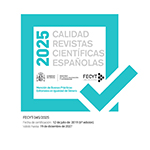Concubinarios, herejes y usurpadores: justicia eclesiástica, comunicación y ‘propaganda’ en Las Montañas del obispado de Burgos en el siglo xv
Resumen
El presente artículo tiene como objetivo paliar el estado de nuestros conocimientos en torno al ejercicio de la justicia eclesiástica en la Castilla del siglo XV a través de algunos ejemplos de La Montaña, en el Norte de la diócesis de Burgos, con el objetivo de aproximarnos a dos cuestiones fundamentales para la comprensión de la sociedad castellana, como son el ejercicio de la justicia episcopal como justificación del poder eclesial y la utilización de los tribunales de justicia como ámbito de conformación y control de las actitudes populares respecto al poder eclesiástico. En primer lugar, se analizan las características de la justicia ordinaria de la Iglesia, en segundo, la organización de la justicia del obispo de Burgos y, en tercero, la labor judicial en el territorio de Las Montañas con relación a tres temas: los clérigos concubinarios, las desviaciones religiosas de los feligreses y la usurpación de bienes y derechos de la Iglesia. De esta manera, el objetivo final consiste en observar la manera en que los discursos emanados de los tribunales ordinarios episcopales constituyeron una vía coercitiva de comunicación religiosa y de propaganda oral sobre los cuales se apoyó el poder de persuasión de la Iglesia.Descargas
Descarga artículo
Licencia
La revista En la España Medieval, para fomentar el intercambio global del conocimiento, facilita el acceso sin restricciones a sus contenidos desde el momento de su publicación en la presente edición electrónica, y por eso es una revista de acceso abierto. Los originales publicados en esta revista son propiedad de la Universidad Complutense de Madrid y es obligatorio citar su procedencia en cualquier reproducción total o parcial. Todos los contenidos se distribuyen bajo una licencia de uso y distribución Creative Commons Reconocimiento 4.0 (CC BY 4.0). Esta circunstancia ha de hacerse constar expresamente de esta forma cuando sea necesario. Puede consultar la versión informativa y el texto legal de la licencia.
La revista En la España Medieval no cobra por tasas por envío de trabajos, ni tampoco cuotas por la publicación de sus artículos.












